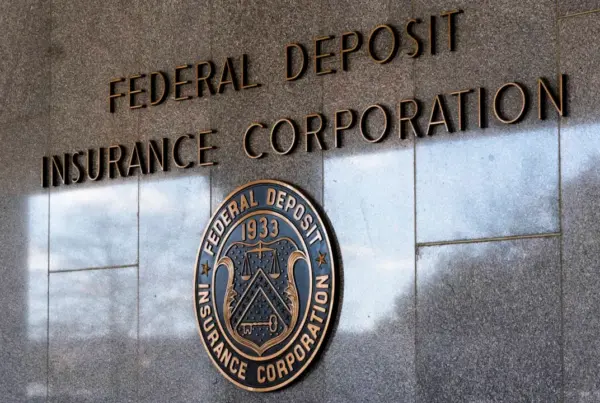“`html
FDIC’s Proposed Rules on Brokered Deposits: Key Insights for Financial Institutions
On August 23, 2024, the Federal Deposit Insurance Corporation (FDIC) proposed significant amendments to its regulations governing brokered deposits. This regulatory action aims to clarify and expand the definition of “deposit broker,” impacting how financial institutions engage with depositors and intermediaries. The proposed rule is a response to evolving market dynamics and concerns regarding the stability and risk management of deposit-taking institutions.
Historically, the FDIC has enforced regulations under the Federal Deposit Insurance Act, particularly Section 29, which defines deposit brokers and outlines the conditions under which banks can accept brokered deposits. The recent proposal builds upon previous amendments aimed at enhancing transparency and protecting the deposit insurance fund. The primary concern addressed by this regulatory update is the potential risk posed by certain deposit arrangements that may threaten the safety and soundness of insured depository institutions.
Key Regulatory Changes & Analysis
1. Expansion of the Definition of Deposit Broker
The proposed rule broadens the definition of “deposit broker” to include additional entities that facilitate the placement of deposits. Key changes include:
- Inclusion of New Intermediaries: The definition now encompasses entities that engage in deposit placement activities, regardless of their business model or the nature of their relationships with banks.
- Clarification of Exemptions: Certain exemptions previously available to specific types of entities will be re-evaluated, potentially limiting the scope of who qualifies for these exemptions.
2. New Reporting Requirements
The proposed regulations introduce enhanced reporting obligations for banks regarding brokered deposits:
- Monthly Reporting: Banks will be required to report the volume and sources of brokered deposits on a monthly basis.
- Transparency Enhancements: These reports aim to provide the FDIC with better oversight of deposit flows and potential risks associated with brokered deposits.
3. Impact on Deposit Insurance Assessments
The amendments may also affect how deposit insurance assessments are calculated:
- Risk-Based Assessments: The FDIC is considering a more risk-sensitive approach to assess the insurance premiums for institutions heavily reliant on brokered deposits.
- Potential Cost Increases: Financial institutions may face higher assessment rates, impacting their overall cost structure.
4. Compliance Framework Adjustments
The proposed changes necessitate a reevaluation of compliance frameworks within affected institutions:
- Policy Updates: Banks will need to update their internal policies and procedures to align with the new definitions and reporting requirements.
- Training and Education: Staff training will be essential to ensure compliance with the revised regulations.
Legal and Industry Implications
The proposed FDIC rules present several legal and operational challenges for financial institutions:
- Compliance Burdens: Institutions may incur additional costs related to compliance, including new systems for tracking and reporting brokered deposits.
- Legal Risks: The expansion of the definition of deposit brokers could lead to increased scrutiny and potential enforcement actions against institutions that fail to adhere to the new standards.
- Litigation Considerations: Institutions may face legal challenges related to the interpretation of the new rules, especially concerning the definition of deposit brokers.
To mitigate risks, law firms and financial institutions should closely monitor developments and prepare for potential legal challenges that may arise as the industry adapts to these changes.
Recommended Actions & Compliance Strategies
Affected financial institutions should take the following steps to ensure compliance with the proposed FDIC regulations:
- Review and Revise Internal Policies: Conduct a comprehensive review of existing policies related to brokered deposits and update them in accordance with the proposed changes.
- Implement Reporting Mechanisms: Develop or enhance systems for tracking and reporting brokered deposits to meet the new monthly reporting requirements.
- Engage in Public Comment: Institutions are encouraged to participate in the public comment period to voice concerns or suggestions regarding the proposed rule. Comments can be submitted through the FDIC’s official channels.
Key Deadlines
- Public Comment Period: Stakeholders should be aware of the timeline for submitting comments, which will be specified in the final rule announcement.
- Implementation Timeline: Institutions should prepare for potential implementation deadlines following the finalization of the rule.
Conclusion & Next Steps
The FDIC’s proposed changes to the regulations governing brokered deposits represent a significant shift in the regulatory landscape for financial institutions. Key takeaways include an expanded definition of deposit brokers, new reporting requirements, and potential changes to deposit insurance assessments.
As institutions prepare for these changes, they should remain vigilant regarding the implementation timeline and any forthcoming regulatory developments. Given the contentious nature of these proposals, stakeholders should also anticipate potential legal or legislative actions that could influence enforcement and compliance obligations in the future.
By proactively addressing these regulatory updates, financial institutions can better position themselves to navigate the evolving landscape of FDIC regulations and maintain compliance with federal standards.
“`


